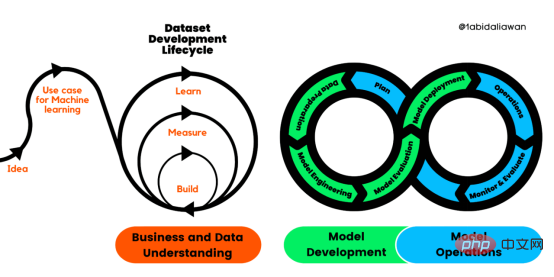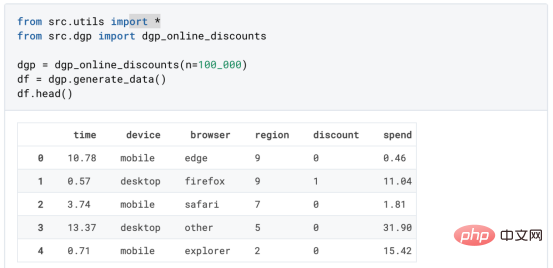 Technology peripherals
Technology peripherals AI
AI How to use machine learning to revolutionize logistics and supply chain management
How to use machine learning to revolutionize logistics and supply chain management
Machine learning can bring huge benefits, including real-time demand forecasting, sustainable logistics and advanced predictive analytics. The logistics and supply chain industry is a complex network of interconnected components that require careful planning, execution, and optimization to ensure smooth and efficient operations. The industry is constantly evolving, and as technology emerges, new solutions are being developed to solve traditional problems. Machine learning is one such technology that has the potential to revolutionize logistics and supply chain management.
Machine learning has the ability to analyze large amounts of data, identify patterns, and make predictions that humans may not be able to perceive. This capability of ML has caught the attention of logistics and supply chain managers who are looking for ways to improve operational efficiency, reduce costs, and increase customer satisfaction. In this article, we explore the benefits of machine learning in logistics and supply chain management and its potential to transform the industry.
1. Strengthen predictive maintenance
Predictive maintenance is a proactive maintenance strategy that uses machine learning algorithms to predict when machines are likely to fail. By analyzing data from sensors and other sources, ML algorithms can detect patterns that indicate impending failure. This enables logistics and supply chain managers to schedule maintenance before machine failure, minimizing downtime and reducing repair costs.
For example, International Express uses machine learning algorithms to predict the maintenance needs of its delivery trucks. By analyzing data from sensors mounted on the trucks, algorithms can identify potential problems and alert maintenance teams. This resulted in a 10% reduction in maintenance costs and a 25% reduction in truck downtime.
2. Provide accurate demand forecasts
Demand forecasts are critical to logistics and supply chain managers as it enables them to plan production, inventory and transportation. Machine learning algorithms can analyze historical data and external factors such as weather, holidays and economic trends to accurately predict future demand. This helps managers optimize inventory levels, reduce stock-outs, and minimize waste.
For example, Walmart relies on machine learning algorithms to predict demand for its products. By analyzing sales data and other factors, algorithms can predict demand with a high degree of accuracy. This allows Walmart to optimize inventory levels, reduce waste and increase customer satisfaction.
3. Improve route optimization
Route optimization is a complex problem in logistics and supply chain management, and machine learning can help solve it. Machine learning algorithms can analyze data from various sources, such as traffic patterns, weather conditions and delivery schedules, to determine the most efficient delivery routes. This helps reduce shipping costs, minimize delivery times, and increase customer satisfaction.
For example, UPS utilizes an ML-based optimization engine called ORION to determine the most efficient delivery routes for its drivers. By analyzing data from a variety of sources, ORION can optimize routes in real time, reducing annual driving distance by 100 million miles and saving 10 million liters of fuel.
4. Maximize warehouse optimization
Warehouse optimization is crucial for logistics and supply chain managers as it allows them to maximize available space, reduce inventory costs, and improve orders fulfill. ML algorithms can analyze data from sensors, cameras and other sources to optimize warehouse layout, inventory placement and order picking processes.
For example, Amazon uses machine learning algorithms to optimize its warehouse operations. By analyzing data from sensors and cameras, the algorithm can optimize the inventory arrangement and order picking process. This resulted in a 50% reduction in operating costs and a 60% increase in warehouse capacity.
What’s next for machine learning in logistics and supply chain?
The logistics and supply chain industry is undergoing significant changes with the emergence of machine learning technology. Machine learning can have a significant impact on the future of logistics and supply chain management.
Machine learning algorithms can analyze large amounts of data, identify patterns and make predictions, which can help logistics and supply chain managers optimize operations, reduce costs and improve customer satisfaction. The application of machine learning in logistics and supply chain management is still in its early stages, and there is huge potential for innovation and improvement.
The above is the detailed content of How to use machine learning to revolutionize logistics and supply chain management. For more information, please follow other related articles on the PHP Chinese website!
 解读CRISP-ML(Q):机器学习生命周期流程Apr 08, 2023 pm 01:21 PM
解读CRISP-ML(Q):机器学习生命周期流程Apr 08, 2023 pm 01:21 PM译者 | 布加迪审校 | 孙淑娟目前,没有用于构建和管理机器学习(ML)应用程序的标准实践。机器学习项目组织得不好,缺乏可重复性,而且从长远来看容易彻底失败。因此,我们需要一套流程来帮助自己在整个机器学习生命周期中保持质量、可持续性、稳健性和成本管理。图1. 机器学习开发生命周期流程使用质量保证方法开发机器学习应用程序的跨行业标准流程(CRISP-ML(Q))是CRISP-DM的升级版,以确保机器学习产品的质量。CRISP-ML(Q)有六个单独的阶段:1. 业务和数据理解2. 数据准备3. 模型
 2023年机器学习的十大概念和技术Apr 04, 2023 pm 12:30 PM
2023年机器学习的十大概念和技术Apr 04, 2023 pm 12:30 PM机器学习是一个不断发展的学科,一直在创造新的想法和技术。本文罗列了2023年机器学习的十大概念和技术。 本文罗列了2023年机器学习的十大概念和技术。2023年机器学习的十大概念和技术是一个教计算机从数据中学习的过程,无需明确的编程。机器学习是一个不断发展的学科,一直在创造新的想法和技术。为了保持领先,数据科学家应该关注其中一些网站,以跟上最新的发展。这将有助于了解机器学习中的技术如何在实践中使用,并为自己的业务或工作领域中的可能应用提供想法。2023年机器学习的十大概念和技术:1. 深度神经网
 基于因果森林算法的决策定位应用Apr 08, 2023 am 11:21 AM
基于因果森林算法的决策定位应用Apr 08, 2023 am 11:21 AM译者 | 朱先忠审校 | 孙淑娟在我之前的博客中,我们已经了解了如何使用因果树来评估政策的异质处理效应。如果你还没有阅读过,我建议你在阅读本文前先读一遍,因为我们在本文中认为你已经了解了此文中的部分与本文相关的内容。为什么是异质处理效应(HTE:heterogenous treatment effects)呢?首先,对异质处理效应的估计允许我们根据它们的预期结果(疾病、公司收入、客户满意度等)选择提供处理(药物、广告、产品等)的用户(患者、用户、客户等)。换句话说,估计HTE有助于我
 使用PyTorch进行小样本学习的图像分类Apr 09, 2023 am 10:51 AM
使用PyTorch进行小样本学习的图像分类Apr 09, 2023 am 10:51 AM近年来,基于深度学习的模型在目标检测和图像识别等任务中表现出色。像ImageNet这样具有挑战性的图像分类数据集,包含1000种不同的对象分类,现在一些模型已经超过了人类水平上。但是这些模型依赖于监督训练流程,标记训练数据的可用性对它们有重大影响,并且模型能够检测到的类别也仅限于它们接受训练的类。由于在训练过程中没有足够的标记图像用于所有类,这些模型在现实环境中可能不太有用。并且我们希望的模型能够识别它在训练期间没有见到过的类,因为几乎不可能在所有潜在对象的图像上进行训练。我们将从几个样本中学习
 LazyPredict:为你选择最佳ML模型!Apr 06, 2023 pm 08:45 PM
LazyPredict:为你选择最佳ML模型!Apr 06, 2023 pm 08:45 PM本文讨论使用LazyPredict来创建简单的ML模型。LazyPredict创建机器学习模型的特点是不需要大量的代码,同时在不修改参数的情况下进行多模型拟合,从而在众多模型中选出性能最佳的一个。 摘要本文讨论使用LazyPredict来创建简单的ML模型。LazyPredict创建机器学习模型的特点是不需要大量的代码,同时在不修改参数的情况下进行多模型拟合,从而在众多模型中选出性能最佳的一个。本文包括的内容如下:简介LazyPredict模块的安装在分类模型中实施LazyPredict
 Mango:基于Python环境的贝叶斯优化新方法Apr 08, 2023 pm 12:44 PM
Mango:基于Python环境的贝叶斯优化新方法Apr 08, 2023 pm 12:44 PM译者 | 朱先忠审校 | 孙淑娟引言模型超参数(或模型设置)的优化可能是训练机器学习算法中最重要的一步,因为它可以找到最小化模型损失函数的最佳参数。这一步对于构建不易过拟合的泛化模型也是必不可少的。优化模型超参数的最著名技术是穷举网格搜索和随机网格搜索。在第一种方法中,搜索空间被定义为跨越每个模型超参数的域的网格。通过在网格的每个点上训练模型来获得最优超参数。尽管网格搜索非常容易实现,但它在计算上变得昂贵,尤其是当要优化的变量数量很大时。另一方面,随机网格搜索是一种更快的优化方法,可以提供更好的
 人工智能自动获取知识和技能,实现自我完善的过程是什么Aug 24, 2022 am 11:57 AM
人工智能自动获取知识和技能,实现自我完善的过程是什么Aug 24, 2022 am 11:57 AM实现自我完善的过程是“机器学习”。机器学习是人工智能核心,是使计算机具有智能的根本途径;它使计算机能模拟人的学习行为,自动地通过学习来获取知识和技能,不断改善性能,实现自我完善。机器学习主要研究三方面问题:1、学习机理,人类获取知识、技能和抽象概念的天赋能力;2、学习方法,对生物学习机理进行简化的基础上,用计算的方法进行再现;3、学习系统,能够在一定程度上实现机器学习的系统。
 超参数优化比较之网格搜索、随机搜索和贝叶斯优化Apr 04, 2023 pm 12:05 PM
超参数优化比较之网格搜索、随机搜索和贝叶斯优化Apr 04, 2023 pm 12:05 PM本文将详细介绍用来提高机器学习效果的最常见的超参数优化方法。 译者 | 朱先忠审校 | 孙淑娟简介通常,在尝试改进机器学习模型时,人们首先想到的解决方案是添加更多的训练数据。额外的数据通常是有帮助(在某些情况下除外)的,但生成高质量的数据可能非常昂贵。通过使用现有数据获得最佳模型性能,超参数优化可以节省我们的时间和资源。顾名思义,超参数优化是为机器学习模型确定最佳超参数组合以满足优化函数(即,给定研究中的数据集,最大化模型的性能)的过程。换句话说,每个模型都会提供多个有关选项的调整“按钮


Hot AI Tools

Undresser.AI Undress
AI-powered app for creating realistic nude photos

AI Clothes Remover
Online AI tool for removing clothes from photos.

Undress AI Tool
Undress images for free

Clothoff.io
AI clothes remover

AI Hentai Generator
Generate AI Hentai for free.

Hot Article

Hot Tools

ZendStudio 13.5.1 Mac
Powerful PHP integrated development environment

SublimeText3 Linux new version
SublimeText3 Linux latest version

MantisBT
Mantis is an easy-to-deploy web-based defect tracking tool designed to aid in product defect tracking. It requires PHP, MySQL and a web server. Check out our demo and hosting services.

Atom editor mac version download
The most popular open source editor

mPDF
mPDF is a PHP library that can generate PDF files from UTF-8 encoded HTML. The original author, Ian Back, wrote mPDF to output PDF files "on the fly" from his website and handle different languages. It is slower than original scripts like HTML2FPDF and produces larger files when using Unicode fonts, but supports CSS styles etc. and has a lot of enhancements. Supports almost all languages, including RTL (Arabic and Hebrew) and CJK (Chinese, Japanese and Korean). Supports nested block-level elements (such as P, DIV),





